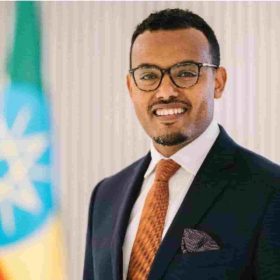Mamo Mihretu Biography, Age, Career, Net Worth 2023, Family, Wikipedia & More

This article will let us know about Mamo Mihretu Biography, Age, Career, Net Worth 2023, Family, Wikipedia & More.
Biography
In addition to his role as Chief Trade Negotiator, Mr. Mamo Mihretu serves as Senior Policy Advisor to the Prime Minister of Ethiopia. Mr. Mamo worked as a Senior Private Sector Specialist for the World Bank Group before joining the administration of Prime Minister Abiy Ahmed. During his time there, he oversaw the implementation of various programs in Ethiopia, including those for trade logistics, tax simplification, business regulation, and investment promotion. Mr. Mamo is a trained attorney who boasts many academic credentials, including a Master of Public Administration degree from Harvard Kennedy School, a Bachelor of Laws degree from Addis Ababa University, and a certification in international trade and investment from the University of Amsterdam. Mr. Mamo was recognized by the Financial Times as one of the rising young technocrats guiding Ethiopia’s comprehensive reform initiative.
Career
The Prime Minister of Ethiopia put Mamo Mihretu, who was his policy advisor and chief trade negotiator, in charge of Ethiopia’s sovereign fund.
Mamo has been named the first chief executive officer (CEO) of the state-owned investment company Ethiopian Investment Holdings (EIH). It was set up by a decree from the Council of Ministers last month. The Prime Minister is in charge of a board of six directors.
The Fund is allowed to have 100 billion Br in capital, but only 25 billion Br will be paid up. It gets money from a pool of state-owned assets that it manages, from returns and income from investing the money from the sale of its assets, from the sale of its assets and businesses, and from loans and other sources like bonds. Blen Mammo, a senior economic advisor at the Ministry of Finance, says that it is set up like 10 similar funds in Africa. It is called a sovereign wealth fund.
Mamo has worked on reforms in the economic, legal, and logistics sectors for more than 16 years. He was one of the “young liberal technocrats” with international experience who joined the government of Prime Minister Abiy Ahmed (PhD). He had one child. Eyob Tekalign (PhD), a state minister for finance, and Abebe Abebayehu, who was head of the Investment Commission for the first two years after 2018, joined the government with the promise of changing the economy from one run by the government to one run by private capital in a competitive market.
Mamo was in charge of the World Bank’s work in Ethiopia in finance, competitiveness, and trade for eight years before he joined the government in 2018. He works in the Prime Minister’s office, where he mostly talks about trade issues like the Africa Continental Free Trade Area (AfCFTA). Mamo went to Addis Abeba University to study law. After that, he went to the universities of Pretoria and Amsterdam to finish a post-graduate program in law. He also took classes in leadership and economic growth at the Kennedy School of Government at Harvard University.
The EIH has asked to join the International Forum of Sovereign Wealth Funds (IFSWF), a group of 40 sovereign wealth funds that includes the China Investment Corporation, the Kuwait Investment Authority, and the Abu Dhabi Investment Authority, among others. Blen says that a deal has been made and that the company will join as an associate member.
Ethiopian Investment Holdings wants to take care of 24 state-owned businesses (SOEs). Assets that are likely to fall under its management include state-owned businesses and assets, share companies and financial institutions, land and properties owned by the state, and other tangible and intangible assets in which the federal government has a stake. Blen told Fortune that it is using portfolio management to figure out which businesses to take on during its first phase of operations.
“We want to make sure that all of our wealth is used,” Blen said.
The Public Enterprises Holding & Administration Agency is in charge of about 36 public companies. About half of them, like the Ethiopian Railway Corporation (ERC), the Ethiopian Electric Power (EEP), and the Land Bank & Development Corporation (LBDC), came under its control earlier this year.
Sources with knowledge of the situation say that the Agency will not be dissolved. It will keep running state-owned businesses that will not be given to Ethiopian Investment Holdings.
Experts warn, though, that there needs to be a good reason to invest in certain areas.
A financial analyst named Abdulmenan Mohammed said, “In the past, market failure was used as an excuse for government investment in certain sectors.”
He said that most of these investments have been “riddled” with corruption, waste, and inefficiency, which makes him doubt the state’s ability to run a company of this size.
The Fund is supposed to take on divestment projects both in the United States and abroad. Dividends from businesses that are part of the Fund are not subject to taxes or fees, but this does not apply to sub-funds or companies in which the EIH invests.
National wealth funds like the ones in India and the United Arab Emirates (UAE) don’t have to pay taxes on infrastructure investments. Last year, the Abu Dhabi Wealth Fund got tax breaks for investments it planned to make before 2024 in textile parks, agriculture markets, telecom towers, and power plants. Even though this helps companies stay competitive on the global market, it could hurt private businesses that serve the domestic market, says Million Kibret, managing partner of BDO Ethiopia, an investment advisory firm that works under BDO East Africa.
Age
At the time of writing this article, his age is yet to be known.











